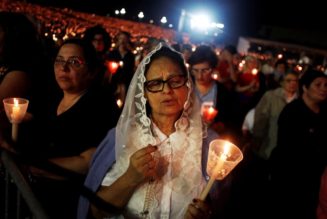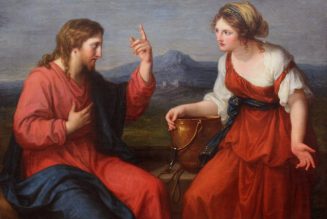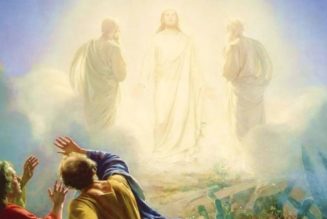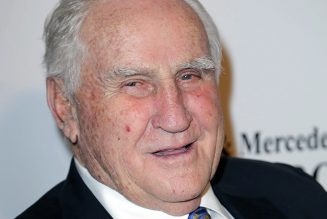
In Advent, the Gospels focused on John the Baptist telling us to expect Jesus to come to us.
Now, on the Second Sunday of Ordinary Time Year A, we are still listening to John the Baptist — only now, he is telling us that Jesus is expecting us to come to him.
And after all of the hoopla and anticipation, after the big reveal of Jesus, what follows? Crickets.
The order of events our Masses are covering goes like this: At the Baptism of Jesus, John said “I need to be baptized by you, and yet you are coming to me?”
This Sunday’s Gospel passage starts on the very next day after Jesus was baptized. What we read in Mass omits the first few words of the verse. In full it says: “The next day John saw Jesus coming toward him and said ‘Behold the Lamb of God.”
So it seems like on Day One as John baptized Jesus, John said, more or less publicly, “He’s the one.” On Day Two he says forcefully, “There he is! He has come!” and he gets very little reaction.
After this Sunday’s Gospel passage John describes Day Three: “The next day John was there again with two of his disciples.” This time when he points to Jesus, the disciples actually go and join him.
This gives context to several of the stories of the calling of the Apostles. We think of them as dropping everything and following Jesus the moment they met him. That doesn’t appear to be true. They had to be repeatedly told about Jesus to embrace him.
Maybe they delayed because they needed time to process what John was saying.
John the Baptist says something extraordinary in the Gospel when he calls Jesus “the Lamb of God who takes away the sins of the world.”
“Taking away the sins of the world” was not front of mind to Jews awaiting for the Messiah. They expected other kinds of healing and victory; and when Jesus does begin “taking away the sins in the world” he is immediately confronted by Jewish leaders telling him that only God can do that.
So that idea probably took a lot of getting used to.
So did what John says next in this Gospel. He says God told him “On whomever you see the Spirit come down and remain, he is the one who will baptize with the Holy Spirit.” Then he identifies Jesus as the One.
This is how it is in our lives. Most of us are pointed to Jesus again and again before we actually approach him.
Then, once we do find him, what he offers us is not what we expected.
This is the lesson Paul plans to take up with the Corinthians. Through two epistles he will line out their difficulties and offer answers, but Sunday’s Second Reading is the very first words in the first letter. They frame everything he will be telling them.
He says in every way possible that the Corinthian Christians need to identify themselves with Jesus Christ.
- First, indvidually. Paul says he, personally is an apostle of Jesus. This will be important to the Corinthians who were living their individual lives sinfully in some case, including frequenting prostitutes, as though personal behavior didn’t matter.
- Second, locally. Paul tells the Corinthians that they are “the church of God that is in Corinth” and have been sanctified “in Christ Jesus.” He wants them to first live as Corinthians, not pretending that they are above local customs. He will tell women to wear veils in worship services, since local women do; and he will say that, though Christians may eat food sacrificed to idols innocently, they should not do so if it misleads others.
- Third, universally. Paul puts them in a larger group of people “everywhere” who “call upon the name of Jesus Christ.” Paul will help them see that their liturgy is part of a universal liturgy, describing the sacrifice of the Mass.
- Fourth, eternally. Paul calls down “Peace from God the Father and the Lord Jesus Christ.” He wants the Corinthians to look forward to their ultimate destiny at the resurrection of the dead.
John’s message in the Sunday Gospel is something entirely new in salvation history: He is a prophet who has gone beyond sharing symbolic messages and cryptic images from God’s point of view. He is a prophet on intimate terms with God’s interior life who points directly at the incarnate Son of God who brings the Holy Spirit.
Paul’s message in the Second Reading grows directly from John’s. He points out that, every Christian is something new in salvation history now: We are not just God’s Chosen people or followers of Jesus Christ, we are adopted sons and daughters of God the Father in Jesus, on intimate terms with God’s Holy Spirit.
John was not the last person to have his unique relationship with God. He was the first of millions. John identifies Jesus as “the one who will baptize with the Holy Spirit.” Every one of us who has been baptized has received what John had and more.
Our job is to embrace our identity in Christ at each level Paul mentions.
First, personally. The first in my run-down of “10 Benedict Quotes That Changed My Life” gives great guidance here. Pope Benedict XVI talked about how John Paul II affected him:
“His words constantly echo in my ears: ‘Do not be afraid! Open wide the doors for Christ!’ … Are we not perhaps all afraid in some way? … If we let Christ enter fully into our lives, if we open ourselves totally to him, are we not afraid that He might take something away from us? Are we not perhaps afraid to give up something significant, something unique, something that makes life so beautiful? …
“No! If we let Christ into our lives, we lose nothing, nothing, absolutely nothing of what makes life free, beautiful and great. No! … On the basis of long personal experience of life, I say to you … Do not be afraid of Christ! He takes nothing away, and he gives you everything.”
We hold tight to aspects of our personality that we thank make “us” “us.” But what we find is that the more we emphasize the superficial aspects of our personalities, the less satisfied we are. The more we emphasize the Christian aspects of our lives — goodness, generosity, self-control and faithfulness — the more satisfied and the more “ourself” we feel.
Second, locally. We too often universalize the Church. We look at the entire Church rather than the local reality. But John by the Jordan and Paul writing to Corinth stress that the first way we serve “the Church” is by serving our church. We can’t be a daughter or son of the Church unless we are a daughter or son of our parish.
Third, universally. In the First Reading, the Lord says “You are my servant, Israel, through whom I show my glory.” He has in mind there not just a locality, but a people. This is the vision of our vocation in God that is fulfilled finally in the Church. “I will make you a light to the nations, that my salvation may reach to the ends of the earth.” Ultimately, what we do on the local level has to be in conformity with the universal program of the Church, headed by Pope Francis in Rome.
Fourth, eternally. What all of this adds up to is adoption by God and, ultimately, divinization. “To those who accepted him, he gave power to become children of God,” says Sunday’s Gospel acclamation. That’s what we have to look forward to if God is real and the Church is his. He is and it is.
In short, what is needed is nothing less than a conversion of our lives to God. “There is no happiness in the world comparable to that of the experience known as conversion,” said Robert Hugh Benson.
Thomas Merton said the same thing but put it a different way. “Ultimately, faith is the only key to the universe,” he said. “The final meaning of human existence, and the answers to the questions on which all our happiness depends cannot be found in any other way.”








